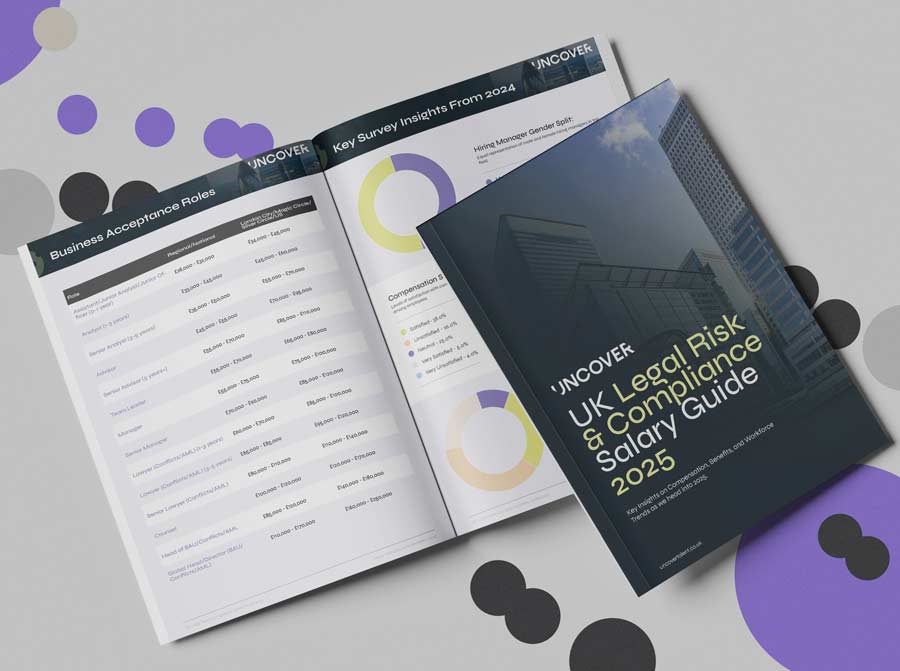As the Legal Risk & Compliance sector expands, it creates more opportunities than ever. Even for junior candidates, there are several paths that you could go down within the industry, making it a brilliant entry to your legal career. On Episode 23 of The UNCOVER Pod, I spoke with Jessie Sangha, the Director of Risk at Moore Barlow, about the advice she’s collected over her 30-year legal career, especially from the last 20 years in Legal Risk & Compliance. Read on for her insights.
What core skills and competencies do you think are essential for somebody to excel in risk management within a law firm?
A lot of lawyers will say that to be an effective listener and have a keen eye for detail, but that’s even more essential in the risk and compliance world. Most of the time, somebody will come to you because they have got themselves into a situation where they need support, and they need to understand how they can move away from the position they’re in. It’s important to have that listening ear.
I’d also say to know your regulations inside-out because they’re constantly changing and evolving. If you don’t know the answer, know where to look. We are a small community, and we look out for and protect each other. I can pick up the phone to somebody like-minded who may have been in this situation before and have a conversation about it.
Risk management can sometimes feel like you’re delivering bad news, but if people see you as a partner in their success, they’ll approach you more openly. I have an open-door policy for breach reporting at Moore Barlow. We don’t throw people under the bus. We don’t have a blame culture or a name-and-shame culture, which can often stop people from readily coming to you with issues.
Patience is key as well, rather than jumping to conclusions. Sometimes, you need to take a step back and analyse the situation that you’re dealing with. Nobody sets out to do the wrong thing, but we’re humans, and we will make mistakes. Then, it’s a case of leading with empathy and trying to get the right outcome.
How can junior professionals differentiate themselves and stand out as strong candidates for these positions?
Be kind to yourself. Don’t run before you can walk. You’re constantly going to be learning, which is the most exciting part of a risk and compliance role. You will always evolve because the legislation is always changing and moving the goalposts. So, make sure you ask questions and use your initiative to do research. Look at the changes in the regulatory world. Keep up to date with the changes that are taking place, whether that’s in the Law Society Gazette, following The UNCOVER Podcast, or whatever else.
AI is a great area for somebody junior who wants to make an impression too. They could come forward in the legal industry and make a difference because people in my position are often not as up-to-date with the technology as one would expect. That’s somewhere the younger generation could help. Think about your policies and procedures and create a form where you can see how AI is being utilised in your workplace. It most likely already is, but your risk managers might not be aware, or the people using it might not know the associated risks.
As a junior, I would always say to be approachable rather than sitting in what can sometimes be seen as a siloed role. If somebody comes up to you with a left-field question, be inquisitive and think, ‘Why has that question come about? How can I get involved with that answer?’ Try to guide people to a resolution rather than saying, ‘No, you can’t do this.’ It shouldn’t be a yes or no answer. Try to think about things differently, and look at how you can navigate it together. The regulations say this: can we be pragmatic, or can we reach a compromise somewhere? It’s important to be inquisitive, research, and find new solutions.
Stay up to date with your own learning and development too. Attend regular courses. It’s about sitting down and taking stock and thinking, ‘Where am I in my career? Where do I want to go? Is there a gap in my knowledge, and how can I go and fill that gap?’ Reach out to people on LinkedIn who are like-minded in your area of work and network with them.
Taking on projects is another way you can make a difference in your firm. A classic example for a junior lawyer is to draft a policy, carry out a gap analysis and see where the risks are first. I would always advocate for seeing where the weak points are and then drafting your policy. Most importantly, involve your key stakeholders and try, if you can, to pilot what you are about to implement before implementation. By doing that, you’ve raised your profile as a junior with the senior stakeholders, and you have been involved in a firm-wide discussion.
What’s the one piece of advice you wish you had known when starting your career in legal risk and compliance?
I think flexibility is everything. Your priorities will shift constantly, so you need to stay organised and be able to pivot. The greatest tool for success in risk management often comes down to your ability to manage the unexpected with composure. Be flexible, and be calm.
To hear more from Jessie, tune into Episode 23 of The UNCOVER Pod here.




